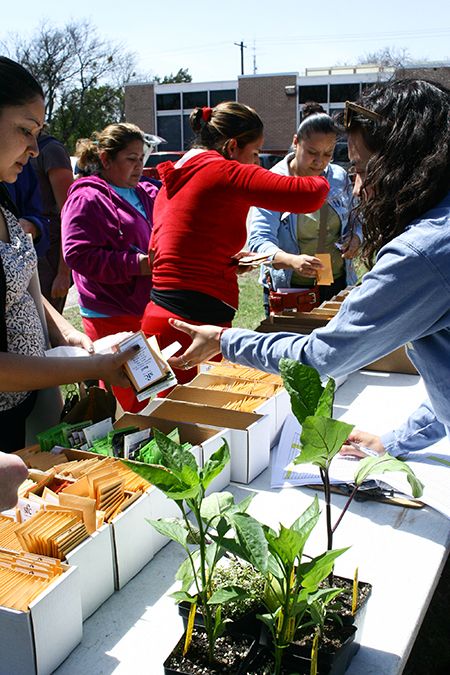Seeds are an integral part of our national and local food system, and nothing is more impressive in the natural world than tiny seeds that create entire plants from almost nothing. I have always had a fascination for seeds ever since I started gardening, and especially since I started to grow heirloom varieties of fruits and vegetables in the Sustainable Food Center Teaching Garden. When I realized how difficult it was to find seeds for edible plants that thrive in Central Texas, are beautiful both in foliage and fruit, and produce delicious fruit, I knew that I had to start saving my own seeds and teach others as well so gardens in Austin can continue to thrive season after season.
Good seeds are hard to come by. If you are looking for non-GMO, organic, locally-appropriate seeds, you either have to purchase packets online or hunt for local gardeners and farmers who save their own seeds – and there aren’t that many. Farmers are constantly faced with the issue of purchasing seeds every year that have patent laws placed on them – meaning that they are unable to save seeds from year to year – and most backyard gardeners are not properly trained in seed saving techniques.
However, for those growers that are passionate about saving seeds from their harvests, community seed libraries can be a great source of these precious seeds. Seed libraries provide free access to seeds, protect the diversity of our food sources, and educate community members about growing food and saving seed. Seed libraries can range in size from housing a couple dozen types of seeds (at a local library branch or non-profit organization, for example) to several thousand varieties, like at the “Doomsday Vault” in the frigid northern island of Svalsbard that houses seed matter for many of our most prized plant varieties at permanently chilled temperatures (also known as a seed bank). Seeds can be donated by local gardeners or farmers, and “borrowed” by other gardeners on the basis that they save seed and return it to the seed bank in the future. SFC hosts its own seed library, which offers participants in the Spread the Harvest program free seeds packaged by volunteers or donated by local nurseries.
Unfortunately for seed and food enthusiasts, seed libraries have recently been at the middle of heated controversy and are at risk for being completed dissolved in some states. In June 2014, a small, local seed library in Pennsylvania was told that it needed to halt all distribution of local seeds, or else they needed to comply with protocol set out by the PA Seed Act and Regulations. This meant that the seed library had to dispose of all seeds at the end of each year or regulate the seeds by including a germination test date, sell by date, lot #, seed kind, distributor's name, and address – all of which could be inconvenient or impossible for small amounts of seed coming from gardeners’ backyards.
Seed laws exist to protect seed consumers from sub-par or adulterated seeds that commercial seed sellers often distribute. However, community seed libraries are very different in scale and nature than commercial seed companies, especially since they aren’t actually selling the seeds (it’s all a donation-based, borrowing process, similar to checking out a book at the library). The law needs to change so as to appropriately protect our community seed libraries so that gardeners and farmers can continue to share and borrow local and geographically appropriate seeds.
I believe that seed libraries are essential to create a sustainable, just, and self-reliant food system. If you believe that seed libraries should be exempt from these seed laws, please consider signing a petition to Save Seed Sharing, or sign up for one of our class offerings and add another layer of sustainability and resilience to your home garden.
All hail the mighty seed!

